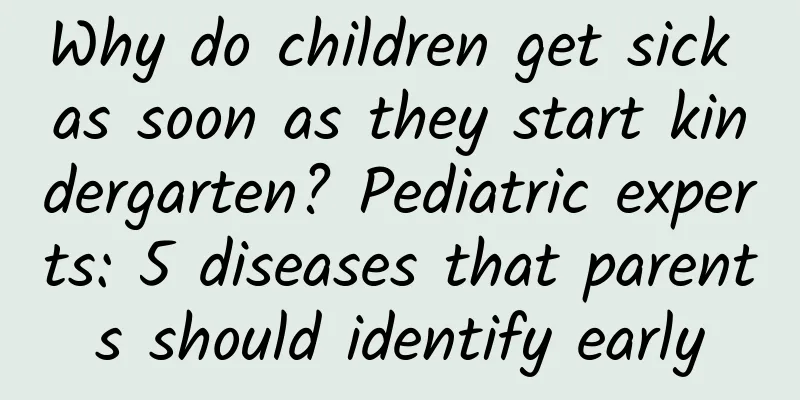Why do children get sick as soon as they start kindergarten? Pediatric experts: 5 diseases that parents should identify early

|
"The child has been in kindergarten for only a few days. Apart from school and home, the place he goes most often is the hospital." After Doudou's mother posted this message on WeChat Moments, several parents who "share the same pain" left messages on WeChat Moments. Every year when children enter kindergarten, parents have this experience: the baby is most likely to get sick in the first month of kindergarten, and some children have suffered from major and minor illnesses during their years in kindergarten. Why do children who rarely get sick at home fail to cope after going to kindergarten? Zhu Sha, deputy chief physician of the Children's Health Center of Hunan Children's Hospital, said that parents should be mentally prepared. Children may get sick more frequently than before when they enter collective environments such as kindergartens or schools. Cultivating good hygiene habits in children can greatly reduce the chance of getting sick, and vaccination before entering kindergarten can improve children's resistance. Why do young children frequently catch colds after entering kindergarten? Xingxing (pseudonym), a 3-year-old girl, had a fever and cough only ten days after entering kindergarten. She went to the hospital and rested at home for a few days. After returning to kindergarten, she started coughing again. "I always thought my baby had good immunity and rarely caught a cold. It seems that kindergarten is a 'touchstone' for children's immunity," said Xingxing's mother. Why do babies start to get sick repeatedly after entering kindergarten? "Children who have just entered kindergarten are generally 2 to 3 years old, and their immune systems are not fully developed. In particular, a small number of children with immune deficiencies have weaker resistance and are more likely to be infected by pathogens and may also infect others." Zhu Sha said that the family environment is simple and the children are well protected. However, in kindergarten, children interact frequently, sleep, attend classes, and eat together, and the chances of contact with various pathogens increase, which can easily cause cross-infection. Zhu Sha introduced that from birth to 6 months old, children mainly obtain immunity from their mothers. After 6 months old, the child's own immunity is gradually formed by stimulating the immune system in the process of constantly fighting against various pathogenic factors (bacteria, viruses, etc.). It is precisely because of these minor illnesses that the child's immunity is constantly improved. Psychological and life factors also affect children's physical health. When young children leave their familiar environment and family and come to an unfamiliar environment, they will inevitably feel fear, anxiety, and lose their appetite, unwilling to drink water, and even cry constantly, which will cause their bodies to be in a state of constant stress and their body resistance to decline. Zhu Sha said that this is a typical separation anxiety. “Improper diet and lack of sleep will also increase the risk of illness in young children. Many children have bad eating habits such as picky eating, force-feeding, and playing while eating. After entering the collective environment of kindergarten, these bad eating habits may cause children to eat poorly, resulting in insufficient nutrient intake and poor absorption.” Zhu Sha said that some young children cannot adapt to the nap in kindergarten because they are playful and curious in the new environment. After returning home, they go to bed when they are very tired from playing. They cannot adapt to the rhythm of kindergarten and over time they are prone to illness due to excessive fatigue. In addition, some babies are wrapped tightly by their mothers when they come to kindergarten. However, there are many activities in kindergarten and teachers cannot take care of every child all the time. Babies also do not know how to add or take off clothes by themselves and are easily sick due to the sudden change of temperature. Five diseases that parents should identify early. Which diseases are most likely to occur in babies who have just entered kindergarten? Zhu Sha introduced that respiratory and digestive system infections are most likely to occur in babies. The most common respiratory disease is cold, followed by suppurative tonsillitis, hand, foot and mouth disease, herpetic pharyngitis, etc.; the most common manifestations of digestive system diseases are diarrhea, abdominal pain, vomiting, constipation, etc. "There are five diseases that are common among kindergarten children and are highly contagious. Parents need to be vigilant and pay attention to early identification." Zhu Sha reminded that the first is influenza, which should be paid special attention to in winter and spring. Influenza is caused by influenza virus and spreads through droplets. It is easy to be infected in kindergartens. It manifests as chills, high fever, headache, body aches, fatigue, runny nose, cough, nasal congestion, etc., and the course of the disease is generally within 1 week; the second is chickenpox, which is highly contagious and more common in children. It can be spread through herpes serum pollutants, droplets, etc., and it is easy to cause an epidemic (chickenpox is initially a red papule, and then becomes a "dewdrop" shaped herpes, accompanied by itching, and scabs after 1 to 2 days. It is more common on the hairline, chest and back, and less common on the limbs); the third is hand, foot and mouth disease Babies under 5 years old are susceptible. Children with hand, foot and mouth disease will have mouth pain, anorexia and low fever, small blisters and ulcers can be seen in the mouth, and there are maculopapular rashes on the hands and feet, which then turn into herpes; the fourth is measles, which is caused by the measles virus and is highly contagious. The clinical manifestations are fever, runny nose, cough, measles mucosal spots, skin maculopapular rashes, etc., and a few can cause serious complications; the fifth is mumps, which is susceptible to school-age children and is transmitted through saliva and droplets. The parotid glands of children are swollen and painful, and often swell forward, backward and downward with the earlobe as the center, with slight fever and tenderness, and are often accompanied by fever. How to keep children from getting sick after entering kindergarten? "The environment in kindergarten is relatively complex, with many sources of infection. Wash your hands frequently, do not misuse other people's cleaning products, cover your mouth and nose with paper when you sneeze and then throw it in the trash can, etc. These good hygiene habits can reduce the chance of children getting sick." Zhu Sha suggested that parents should guide their children to develop good hygiene habits from the details of daily life. Letting children adapt to the new environment as quickly as possible is also a prerequisite for reducing the number of illnesses. Zhu Sha suggested that parents do three things: first, tell the baby in advance why they have to go to kindergarten, that there are teachers and many friends in kindergarten, and what aspects are more interesting than at home, so that the baby will be curious about and yearn for kindergarten life; second, use storytelling, playing house, etc. to help the baby enter the role of a kindergarten child in advance, and minimize the baby's fear and anxiety about the new environment; third, help the baby use the kindergarten's work and rest time as a reference in advance, establish a regular work and rest time at home, do more outdoor activities, go to bed early and get up early, have three meals on time, and try to cultivate the baby's independent eating, toileting, napping and other habits. "In life, children should be taught to develop the ability to express their needs independently as early as possible, and to seek help from teachers or parents as soon as possible when they encounter difficulties," said Zhu Sha. My child gets sick as soon as he arrives at kindergarten. Can I give him some Isatis root regularly? "All medicines are toxic. If the child does not have any symptoms of infection, there is no need to take these medicines for a long time." Zhu Sha reminded that some parents think that their children have poor resistance and buy immunomodulators to improve their children's immunity. In fact, immunity is not determined by parents, but there are medical standards for evaluation. In addition, it is unwise for parents to try to improve their children's resistance through drugs or nutritional supplements, because drugs have a greater interference with the immune system. In particular, they should not take hormone drugs or abuse immunoglobulins without a doctor's guidance. "Vaccination is a more reliable way to improve immunity. Children can improve their resistance by being vaccinated with relevant vaccines before entering kindergarten, such as varicella vaccine, measles, mumps and rubella vaccine, hand, foot and mouth disease vaccine, influenza vaccine, pneumococcal conjugate vaccine, etc.." Zhu Sha reminded parents that if the child's disease is contagious or has not yet fully recovered, the child should go to the hospital for treatment or rest and isolate at home. This will not only allow sick children to receive better care, but also avoid the spread of the virus in the kindergarten. |
<<: What kind of fruit is cherry? How many varieties of cherry are there?
>>: What are the benefits of eating cherries? Are cherries cherries?
Recommend
Where to apply moxibustion on breast nodules
If women's breasts are not well protected, th...
How to deal with postpartum episiotomy wound pain
Regarding the issue of pain from episiotomy wound...
50 predictions for the era of mobile Internet and big data
In the era of big data, everything becomes possib...
Helicobacter pylori eradication protects stomach health and keeps away from the threat of gastric cancer
Helicobacter pylori (Hp) infection is an importan...
How to treat uterine cold and blood cold?
It is very common for women to have cold uterus, ...
Symptoms of incomplete shedding of the endometrium
When the uterine wall sheds uncleanly, it will ha...
Trans fats are harmful, so can we eat foods marked “0” safely?
As the concept of healthy eating becomes more pop...
How can pregnant women tell if they are about to give birth?
Generally speaking, during the first prenatal che...
Pregnant women with low TSH
I believe that most people have never heard of th...
Why is lettuce bitter? How to choose lettuce
Lettuce is a dish that people often order when ea...
Can you still have a baby after a hydatidiform mole?
Hydatidiform mole is a deformed fetus and must be...
What is the best medicine to kill pubic lice?
Key reminder: Pubic lice is a relatively common g...
What causes pelvic inflammatory disease?
We all know that pelvic inflammatory disease is a...
What is the cause of vaginal leucorrhea?
If the vagina is not kept clean and is not cleane...









